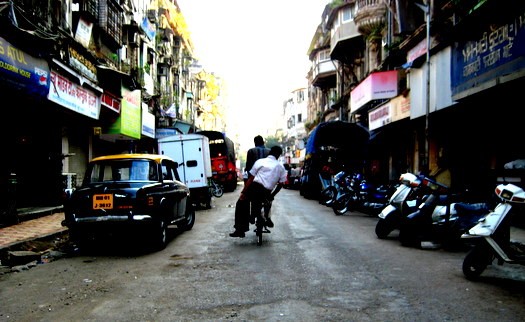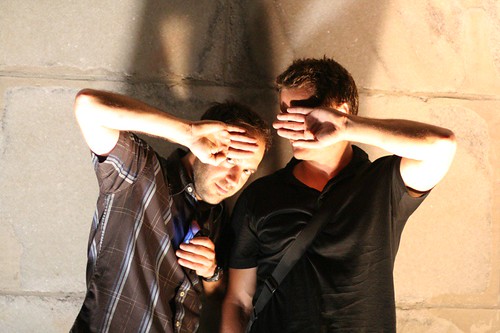It's kinda strange (and thrilling) to browse through the many alleyways and avenues of Flickr and suddenly unearth a photo of … yourself. Just now I came across this picture of myself and a shadowy figure, who I suspect is UX it-guy Jan Chipchase taken last summer during UX Week. My hazy recollection: We met and hung out during a late-night trek through the Mall to the Washington Monument, a epic walk that included UX Week speakers, the entire event staff, and the multi-talented Maggie Mason of Mighty Goods (and, more recently it seems, Mighty Junior), who recorded the journey here. We left late, got back *really* late, and somehow Jan looked none the worse for wear during his keynote the next morning; epic, indeed.
Tag: jan chipchase
Jan Chipchase seems to be the "it" guy1 of user experience these days. He lives in Tokyo, works at Nokia, and plays this kind of swashbuckling, Indiana-Jones-ish role in researching mobile technologies in developing cultures. He keeps an intriguing blog called Future Perfect, where he documents UX-related nuggets from the shantytowns of Lagos, the markets of Accra, the Singapore airport, and so on. This week's NYT Sunday mag has an article about him — "Can the Cellphone End World Poverty" — which, aside from having a somewhat puzzling title, provides an interesting perspective on the field of UX in general.

My own person Jan Chipchase experience: Walking through a back alley in Bombay, from my trip there to deliver design training to GE engineers.
First, what's the title all about?
It's called "Can the Cellphone End World Poverty," but it's really a profile of a researcher rather than an economic analysis of the effect of mobile technologies. And Jan's research — if his blog and conference keynotes are any indication — focuses on the ways in which people in developing cultures *use* and *adapt* the technology, not about the ways in mobile technology can effect macroeconomic change. It's a quibble, really, but it seems strange to describe market research as an effort to "end world poverty," and to cast Nokia in an altruistic light when what they're doing is really identifying and understanding a unserved market and potential customers:
… No company churns out phones like Nokia, which manufactures 1.3 million products daily. Forty percent of the mobile phones sold last year were made by Nokia, and the company's $8.4 billion profit in 2007 reflects as much. Chipchase seems distinctly uncomfortable talking about his part as a corporate rainmaker, preferring to see himself as a mostly dispassionate ethnographer …
I also sympathize with Jan. It would be impossible to do the kind of research he does without a higher purpose, and I know I've spent a lot of time rationalizing some our client work (which is always about the benjamins) with what I imagine the greater good to be. It's easy to say that Nokia's stock will benefit from tapping the billions of people below the poverty line, but it also seems possible that mobile technologies and connectedness in general could effect positive change. Nevertheless, I really think that the article should be called something like, "How the developing world sees technology," or "What the developing world tells us about technology," or something way less catchy than ending world poverty.
What methods are used to gather input from folks in developing nations?
I was most curious to hear anecdotes of what exactly he was asking people, how exactly he was gathering information, whether he was simply observing or conducting surveys, or what. (He has a number of interesting entries on "field research" on his blog, but none that give much insight into his methods). The article has an interesting description of the outcome of an exercise in which people around the world were asked to draw their ideal mobile phone:
[Jan's researching cohorts] said they'd found … [that] the phone represents what people are aspiring to. "It's an easy way to see what's important to them, what their challenges are," [a cohort] said. One Liberian refugee wanted to outfit a phone with a land-mine detector so that he could more safely return to his home village. In the Dharavi slum of Mumbai, people sketched phones that could forecast the weather since they had no access to TV or radio. Muslims wanted G.P.S. devices to orient their prayers toward Mecca. Someone else drew a phone shaped like a water bottle, explaining that it could store precious drinking water and also float on the monsoon waters. In Jacarèzinho, a bustling favela in Rio, one designer drew a phone with an air-quality monitor. Several women sketched phones that would monitor cheating boyfriends and husbands. Another designed a "peace button" that would halt gunfire in the neighborhood with a single touch.
Hmm. I can see how some of this stuff could be helpful in aggregate. People see the phone as a platform — and perhaps there's a sense that it's somewhat magical — a "peace" button, a landmine detector, a cheating boyfriend monitor, etc. (Maybe?) But does the person in Liberia really want a phone, or does he want a land-mine detector? I wonder about this.1 Not I.T. guy. It guy, like it girl. It's sort of amusing to me that it's totally clear what is meant by the words "it girl" but that the words "it guy" just seem to relate to the guy who fixes your internets.
